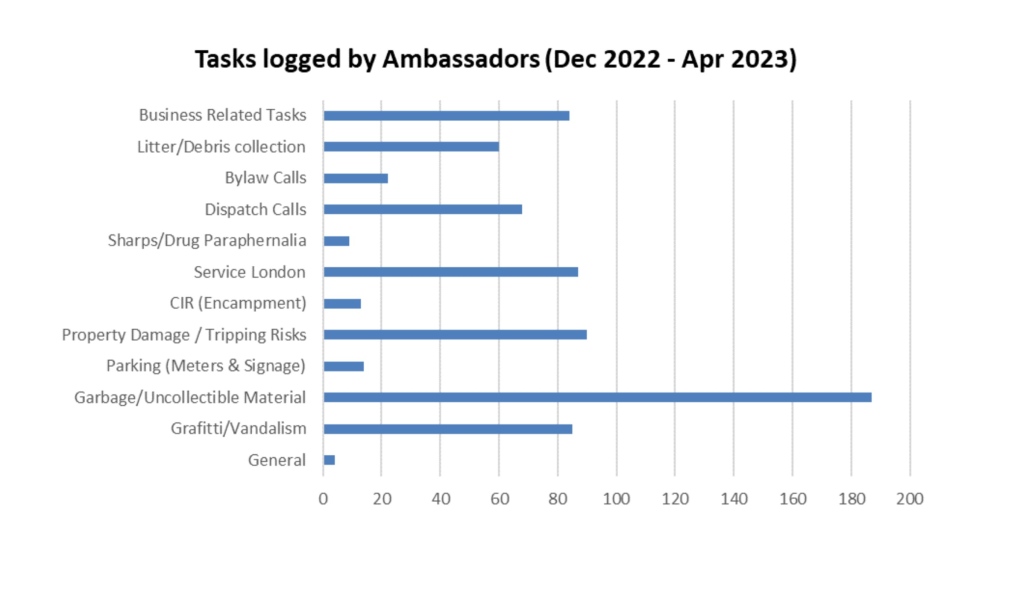Dead men walking? London’s Core Area Ambassadors on council’s budget chopping block
Less than two years after launching the Core Area Ambassador Program as part of a larger economic recovery strategy, city staff recommend pulling the plug.
The cost cutting move puts city staff at odds with the majority of businesses in downtown London, the Old East Village, Richmond Row and Midtown.
“I think it’s ridiculous they’re even considering this!” said Kayla Gibbens, owner of Uber Cool Stuff on Dundas Place. “This is something the downtown needs if we’re going to get our footing back.”
Ambassadors clean up messes, address graffiti, offer directions to visitors, and act as a point of contact between city hall and core area businesses.
A survey conducted by city hall determined:
- 89 per cent of businesses that interacted directly with the ambassadors indicated that they see value in the program continuing
- 63 per cent of businesses that responded think the program should continue
- 65 per cent of all respondents think the program should continue
“They help us sort out the messes in front of our businesses, and down the street. It’s great to have someone to listen to our concerns,” explained Gibbens.
Intended to be a four-year pilot project, its launch was delayed by the COVID-19 pandemic until late 2021.
After less than two years, the program may fall victim to the financial gap anticipated in the 2024-2027 municipal budget.
A new report to council’s Strategic Priorities and Policy Committee (SPPC) identifies the cost of the “interactive aspects” of the program at $550,000 per year.
 Preliminary data showcases the activities of London's Core Area Ambassador Program. (Daryl Newcombe/CTV News London)“Given the significant costs of maintaining the resident and patron interaction portion of the program, it is recommended that this portion of the program be concluded at the end of 2023,” the report reads.
Preliminary data showcases the activities of London's Core Area Ambassador Program. (Daryl Newcombe/CTV News London)“Given the significant costs of maintaining the resident and patron interaction portion of the program, it is recommended that this portion of the program be concluded at the end of 2023,” the report reads.
Former city councillor John Fyfe-Millar supported the ambassador program last term.
He believes council can find budget savings elsewhere.
“Look at the value proposition of this, and what it means to the downtown. What it means to the stability of the core area more than anything else,” Fyfe-Millar told CTV News London.
In the place of the ambassadors who walk in pairs around core business districts, city staff suggest council could create a new position at city hall dubbed the ‘core area business and owner connector’ (CABOC).
The CABOC would act as a liaison between business owners and city hall.
“This position will continue the aspects of this program, valued by core area businesses, without the staffing requirements of the pilot program,” the report reads.
“If they were to make it just one person, they wouldn’t be able to take care of all the concerns that are currently happening in the downtown. They would just be overwhelmed,” said Gibbens.
Fyfe-Millar suggests with core neighbourhoods still struggling, budget dollars earmarked for economic recovery shouldn’t be redirected back into the city’s general coffers.
“If the ambassador program isn’t working the way they want, maybe funnelling some of those funds through to the BIA and giving them some opportunity,” he added.
Members of the Strategic Priorities and Policy Committee will consider the future of the Core Area Ambassador Program on Oct. 10.
CTVNews.ca Top Stories

5 rescued after avalanche triggered north of Whistler, B.C. RCMP say
Emergency crews and heli-skiing staff helped rescue five people who were caught up in a backcountry avalanche north of Whistler, B.C., on Monday morning.
Quebec fugitive killed in Mexican resort town, RCMP say
RCMP are confirming that a fugitive, Mathieu Belanger, wanted by Quebec provincial police has died in Mexico, in what local media are calling a murder.
Bill Clinton hospitalized with a fever but in good spirits, spokesperson says
Former President Bill Clinton was admitted Monday to Georgetown University Medical Center in Washington after developing a fever.
Trump again calls to buy Greenland after eyeing Canada and the Panama Canal
First it was Canada, then the Panama Canal. Now, Donald Trump again wants Greenland. The president-elect is renewing unsuccessful calls he made during his first term for the U.S. to buy Greenland from Denmark, adding to the list of allied countries with which he's picking fights even before taking office.
UN investigative team says Syria's new authorities 'very receptive' to probe of Assad war crimes
The U.N. organization assisting in investigating the most serious crimes in Syria said Monday the country’s new authorities were “very receptive” to its request for cooperation during a just-concluded visit to Damascus, and it is preparing to deploy.
Pioneering Métis human rights advocate Muriel Stanley Venne dies at 87
Muriel Stanley Venne, a trail-blazing Métis woman known for her Indigenous rights advocacy, has died at 87.
King Charles ends royal warrants for Ben & Jerry's owner Unilever and Cadbury chocolatiers
King Charles III has ended royal warrants for Cadbury and Unilever, which owns brands including Marmite and Ben & Jerry’s, in a blow to the household names.
Man faces murder charges in death of woman who was lit on fire in New York City subway
A man is facing murder charges in New York City for allegedly setting a woman on fire inside a subway train and then watching her die after she was engulfed in flames, police said Monday.
Canada regulator sues Rogers for alleged misleading claims about data offering
Canada's antitrust regulator said on Monday it was suing Rogers Communications Inc, for allegedly misleading consumers about offering unlimited data under some phone plans.

































